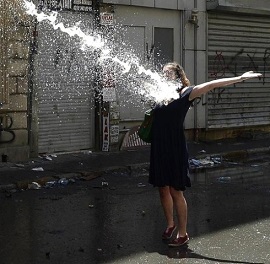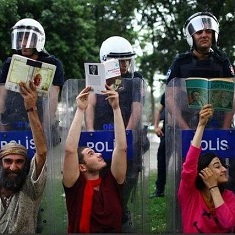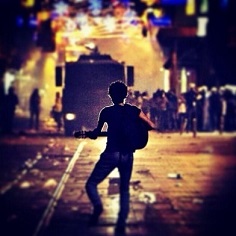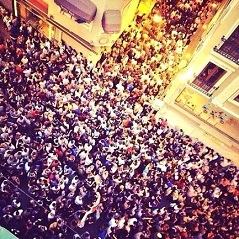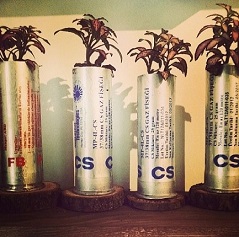RESIST ISTANBUL: A Personal Story
When There Is No Other Way But Resistance! - A Personal Account Of The Early Days Of #Occupygezi
Tarihinde Yayımlandı: This is a piece -her personal story- written by my dear friend Deniz Erkmen on the recent Social Protest Movement (Occupy Gezi). If you are still curious about what is happenning in Istanbul (well by now it is whole Turkey) please keep reading! Thank you so much for your support!
At home in Istanbul, grading student papers while trying to follow a continuous facebook updates of events, I am getting more and more anxious to leave. It is impossible to concentrate. I read few lines from the paper, stop and think “do I have vinegar at home”?
I read a few more lines, stop and wonder “does the pharmacy sell gas masks?” Not able to sit any longer, I call, text and facebook message a few friends; a marine biologist first, a graduate student in history second, then a film director and an environmental engineer… Everyone is planning to head to the Taksim square. I pack some vinegar and a bandanna into my backpack; I make sure I wear sneakers so I can run fast and I leave home not quite sure what is ahead of me.
At the ferry terminal, I greet my friend who just walked there from a meditation workshop. Aslý and I originally met at a yoga class. A month ago, we were at a yoga retreat together, in a small peaceful green campground next to the Mediterrenean. We look at each other, half worry-half smile. Life is, indeed, strange. I notice that her friend has flip flops on; in my mind I go “who will wear flip flops to a demonstration like this?” But this is what happens when you have young writers, yoga teachers, and filmmakers in an uprising. We are not that experienced when it comes to fighting police on the streets; it has not really been our cup of tea until now. But in the next few days, we’ll get our training.
My generation – people born mid 70s to 90s in Turkey have been categorically defined by their apoliticalness. Born around and after the military coup where many activists have been jailed and tortured brutally, many of us, unless their families were activists, have been socialized to avoid “politics.” Demonstrations have been dangerous affairs in Turkey and we have been taught by our families to stay away as much as possible. While this has changed over time to a certain extent, that socialization is strong and has created certain political habits of avoidance. Combine that with the general distrust towards established political institutions that is the trademark of the postindustrial generations and an unresponsive system without many functioning channels for participation, you have people who are not very positive about the possibilities of change through participation.
Then why are all my friends walking towards Taksim? What happened? Why would someone like me, someone who hates crowds, feels slightly awkward when she chants the slogans of the Turkish leftist parties, who flees the city whenever she can to rockclimb, would pack vinegar and a bandanna and walk towards a square where she is pretty sure she will get tear-gassed, maybe even worse?
At this point, I have already been part of the activities that have been going on to protect the small park, Gezi Parký, at Taksim square, which is the social and political center of Istanbul. The park is, comparatively, tiny. Don’t think Central Park or Hyde Park; it is probably not even 1/10th of those. But it is the only green space in this very busy, very urban square. The Justice and Development party (JDP) government has decided unilaterally that they were to turn the park into a shopping mall in a replica of an Ottoman military barrack, even though there are multiple malls in walking distance or a few metro stops away. An association and a platform was formed around the issue and they started organizing and gathering signatures to protect the park.
This attempt to destroy the park was not an isolated case of transferring public property for private development. It was just one incident among the ongoing attacks from the JDP party directed towards public spaces, including not just historical buildings, city squares and neighborhoods, but also forests and national parks. We have been witnessing an ongoing destruction over the years. Just in the last few months, amidsts protests, a beloved pastry shop in a historical building was closed and a cherished movie theater was torn down because they were in a historical building that was sold to be turned into a shopping and entertainment complex. The groundbreaking for the third bridge over Bosphorus which is expected to cause enourmous environmental damage took place against opposition from citizen initiatives and professional bodies. The law to open up national parks to development was just waiting to be discussed at the parliament. We were sharing our concerns among friends and on social media, but were joking about how we couldn’t keep up with the speed of destruction.
Nor was the style new: pushing a big urban project that has no public support, that does not make sense from a public service or urban planning perspective, without any regard for objections coming from the civil society. Tayyip Erdoðan’s version of “democracy” meant that since he was elected and has majority in the parliament, he could do whatever he wanted, however he wanted it.
The governing style was indicative of an increasingly authoritarian and arrogant JDP party that was single-handedly pushing a conservative and neoliberal agenda. On the one hand, there were ongoing series of policies that were enacted that caused fear about state intervention in people’s lives and choices. There was the discussion about banning abortions and stories about women being mistreated in state-hospitals when they went in to get abortions; then the PM demanding families to have three kids. There was the overhaul of the education system with the goal of raising “a religious generation.” There was the ban on alcohol consumption between the hours of 10 pm and 6 am along with a ban on all alcohol advertisement. There was a growing sense that the government was trying to push a life-style and fit the public into a conservative mold.
On the other hand, the problem was not just about our fear for our life-styles. It also looked like the PM was using these interventions to distract everyone from major issues and to woo his followers by emphasizing the party’s conservativeness. In the meantime, democratic deficits of Turkey just continued to exacerbate. Turkey became the country with the highest number of imprisoned journalist in the world. The mainstream media was silenced and the judiciary became an ally for the executive. There was no way to oppose the JDP. Lastly, on May 11, there was a bombing in Reyhanlý, a town on Syrian border, already tense as a result of the civil war in Syria and Turkish government’s support for the opposition forces. 51 people were killed and the goverment reacted by banning the media from reporting on Reyhanlý. 51 people dead, 140 injured and we couldn’t even read about it in the papers.
While these were happening, people around me were getting more and more frustrated. We joked among our friends about how we couldn’t read the newspapers in the morning because we got too depressed to do work; and how we coudn’t read them at night because we lost our sleep. I felt like I was pushed into a corner by the increasingly conservative and authoritarian politics of the JDP, that I had no place to live and breathe in this country. I was feeling suffocated. Suffocated in this once majestic city where I was born and grew up, whose streets I have walked for years. Constantly afraid that any building, any street, and any nature area in other parts of the country that I loved and cherished was about to be destroyed. Voiceless, powerless; I felt helpless and I was angry not just at the government but at my helplessness. Gezi Parký felt like a corner that we were pushed into. It was the last corner. It was small; but I could fight to save it.
So I followed the activities of the Taksim platform; I tried to spread the word over the social media. Then last week, on May 27, we got the news that the government sent bulldozers to start the construction. A small group stopped the bulldozers and on May 28 the police tried to push them out. The Gezi Parký Watch was organized so some activists started sleeping at the park to fend off the bulldozers. People started to go to the park, including myself. The demonstrations were relatively small at first. In fact, I was not quite sure if they would ever get bigger. It was fun; people cheering, singing. A young, educated, colorful crowd, made mostly of anarchists, feminists, socialists, students, LGBT movement… Knowing that we are doing our best to show that we care about our right to this city felt good – but I also was not sure if we got any support beyond the park. And I was not sure what I would do if the police just kicked us out and tore the park down.
But when on the morning of May 31st the police raided the park at 5am, teargassed the demonstrators and burnt their tents down; when they continued to brutally teargas and spray people with water, even during the press release at the Taksim square couple of hours later, when a young woman was shot by tear-gas cannisters in her head, I instictively knew that there was no going back. To protest or not to protest was not a question anymore. The brutality, the arrogance, the sense of injustice was so strong and so in our faces that at last it boiled over. You push people back into a corner, and you keep on attacking, they would have to push back. There is a point where political protest is a defense as much as voice.
What has transpired after that has just been incredible. That night, on the ferry, we could already smell the teargas blowing in the wind from Taksim. We were afraid but we knew what we had to do. We joined others who were coming from all directions as we walked up Cihangir to Sýraselviler with thousands of people, people who looked, how should I put it, very regular. They have finished their work day, walked off their offices and met their friends. They were frustrated with the brutality, with the sense that their lives, their choices, their voices did not matter. They were frustrated about the arrogance of the primeminister. They were tired of feeling helpless. They wanted to breathe, live in freedom.
So they walked and chanted, in solidarity. I had friends who were walking from different directions towards Taksim Square that night and we all had similar stories to tell. Stories of cooperation and kindness amidst chaos. It was scary but incredibly uplifting. Are all street uprisings against police this friendly? These demonstrators were saying “sorry” when they bumped into each other while running away from a tear-gas cannisters. They were sharing their food and water, spraying each others’ teary burning faces with homemade antihistamine-water mixtures, carying one another, shouting “do not panic” while trying to remain calm under tear- gas fire, building barricades together. People were opening their doors and letting strangers in. Older people were shouting words of support from windows and giving protestors lemon, milk and vinegar (to help with the effects of the teargas). It felt like the people of Istanbul, who normally grunt and grind their teeth at each other in public, who elbow their way in and out of public transportation have realized that they actually live in the same city, that they can actually help each other and cooperate… That was the feeling – a moment of enlightenment: Yes, we live in the same city. Yes, we have the right to live like dignified human beings. And yes, we can.
I am pretty sure that this is a turning-point in Turkish political history. A game-changer. Not because of what will come out of it as a result. I have no idea what will come out of these protests. I know that the aftermath of any uprising is chaotic; those that are the most organized have a way of hijacking the process; and established practices and habits do not disappear quickly. Moreover, a lot depends on the primeminister, whose reaction until this point has just been unbelievably, infuriatingly uncompromising. He is transforming himself into a dictator in front of our eyes and provoking his supporters in a very dangerous and irresponsible manner. So, who knows what will happen? I cannot claim to be overly hopeful – if things go downhill from here, there can also be a lot of disappointment.
But I believe that what we have witnessed in the past week was a break of political tradition in Turkey. There has been nothing similar in recent Turkish history, where so many people of different stripes came out on the streets voluntarily, spontenously, and have cooperated, coexisted and resisted together. This was a huge learning experience for all these “apolitical” professionals and youth who saw and experienced first-hand that if they act in solidarity – and they acted in solidarity; the socialists, the secularists, the soccer fans, the feminists, the Kurds – they can achieve something. That there is joy in solidarity and cooperation when you are fighting against injustice. That they can, in fact, use their strongests assets – their wit, creativity and love – against police brutality. Finally, we took to the streets and finally we are not afraid or helpless anymore. Now even my three year old niece says she wants to go out and join the resistance. That gives me some hope.
___________________________________________________________________________________
Article published here: İnsanlik Hali
Photo 1: From Occupy Gezi’s Facebook Page. Photo 2: fbcdn-sphotos-e-a.akamaihd.net
Photo 3: s3-ec.buzzfed.com. Photo 4: © N/A. Photo 5: mashallahnews.com. More photos here
URL: http://www.a-w-i-p.com/index.php/2013/06/11/resist-istanbul-a-personal-story

























